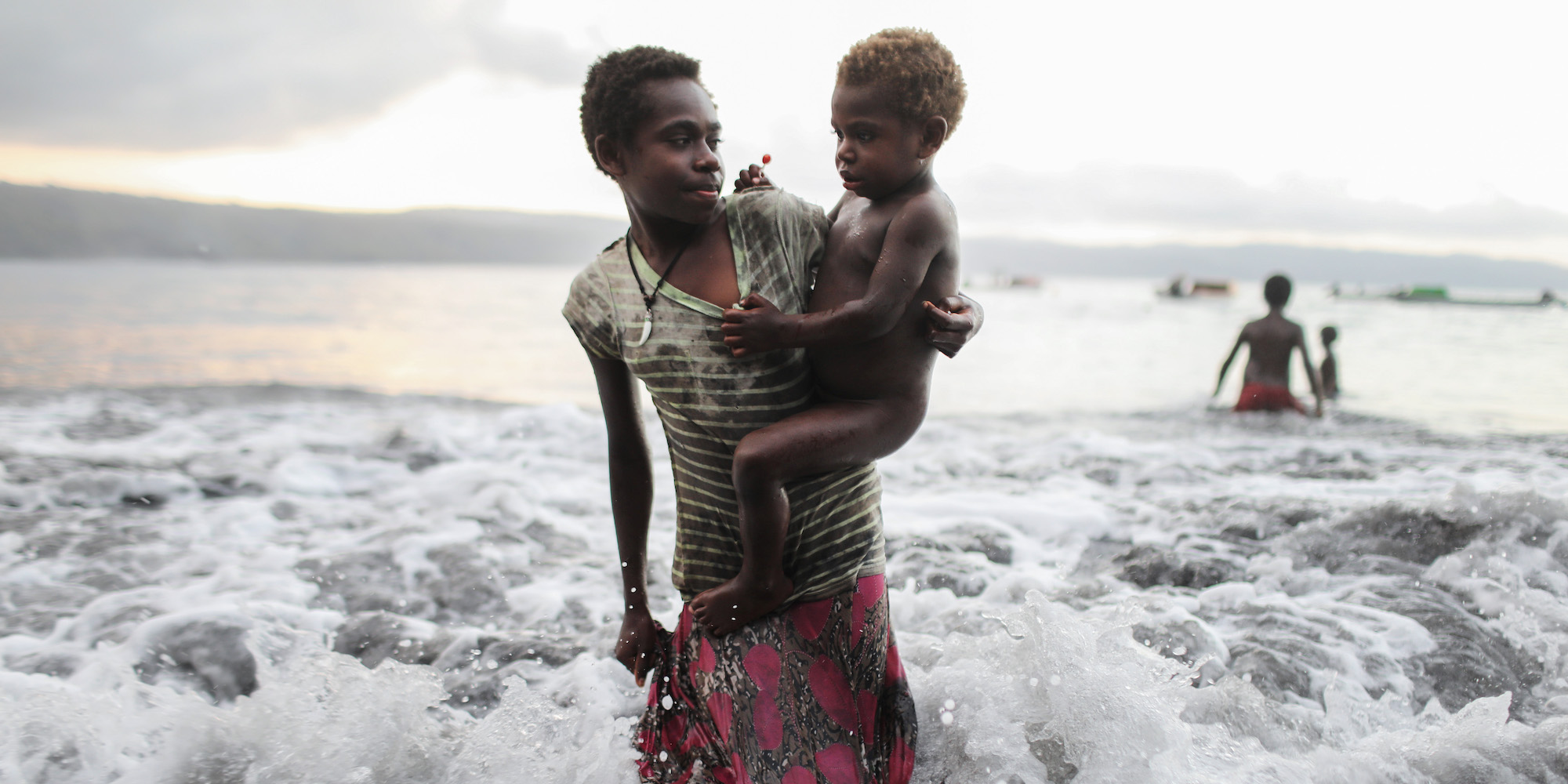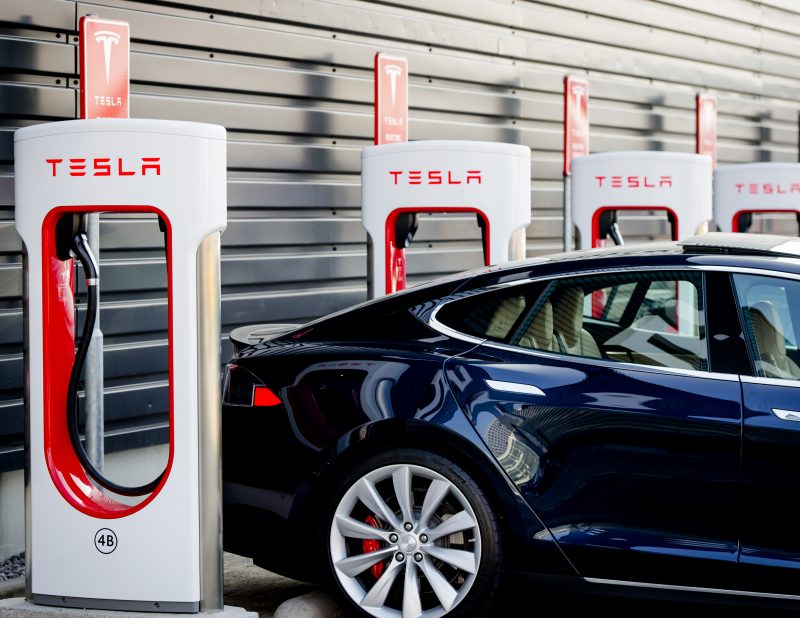- Pacific Island nations, like Tuvalu and Vanuatu, experience climate change every day.
- Warmer waters, coral bleaching, flooding, erosion, and changing weather patterns are changing their way of life.
- In 2018, Vanuatu’s foreign minister Ralph Regenvanu announced the nation was considering suing fossil fuel companies and the governments that enabled them.
- Visit Business Insider’s homepage for more stories.
Rising sea levels aren’t a distant concern in the Pacific.
The traditional way of life in island nations like Vanuatu, Tuvalu, Fiji, Kiribati, and the Marshall Islands is deteriorating because of climate change.
They’re experiencing warmer waters, coral bleaching, tidal flooding, erosion, changing weather patterns, and more brutal cyclones. Thousands of people have already fled the region for New Zealand, seeking a new life.
In 2018, Vanuatu’s foreign minister, Ralph Regenvanu, said his government was considering suing fossil fuel companies and the governments that enabled them.
He told CNN that the country needed compensation, arguing that it contributed only .0016% of global emissions, but bears the brunt of the effects. In January, he told Business Insider by email, "Investigatory work still proceeding, nothing new to update as of yet, no decisions made yet, still looking at options."
Here's what life is like on Vanuatu and Tuvalu, and the struggles they face as the planet warms and sea levels rise.
For some, living in the Pacific is like walking on a knife's edge. This is Funafuti, the capital of Tuvalu, the world's fourth-smallest country.

At points, the island is as narrow as 65 feet wide, according to the United Nations. At its widest, the land measures only about 1,300 feet across.
For others, life is preparing for the next cyclone. This is Vanuatu, which has about 280,000 residents living on 82 islands.

Source: Reuters
In 2015, it was battered by Cyclone Pam, which caused the island to lose about 64% of its GDP.

Source: Reuters
These islands might look like paradise from above, but up close it's another story.

Source: The Guardian
In 2015, the UN released a report that showed the climate change challenges the Pacific Islands — like Tuvalu, Vanuatu, Fiji, Kiribati, and the Marshall Islands — all faced.

Source: Business Insider
In 2019, another UN report found that glaciers were losing hundreds of billions of tons of ice every year, causing seas to rise faster than previously thought.

Source: Business Insider
There are numerous threats stemming from climate change: warmer temperatures, less rainfall, tidal flooding, coastal erosion, and changing weather patterns, including brutal cyclones.

Source: The Guardian
In 2018, Vanuatu's foreign minister, Ralph Regenvanu, made a call. He announced Vanuatu was considering suing fossil fuel companies and the governments that enabled them.

Source: CNN
He told CNN the country needed to be compensated since it contributed .0016% of global emissions, but bore the brunt of the effects. In January he told Business Insider Vanuatu was still investigating its options before taking further action.

Source: CNN
When UN Secretary-General Antonio Guterres visited the Pacific last year, he said it was an existential threat, and the "risks were too real."

He described Tuvalu as"an entire country fighting to preserve its very existence."
Guterres also said Vanuatu was one of "the most disaster-prone countries, made worse by the global climate emergency."
Tuvalu did what it could to draw attention to its plight, too. In 2019, it held the Pacific Islands Forum. Leaders were greeted by a group of children sitting in a moat built around a miniature island, singing, "Save Tuvalu, save the world."
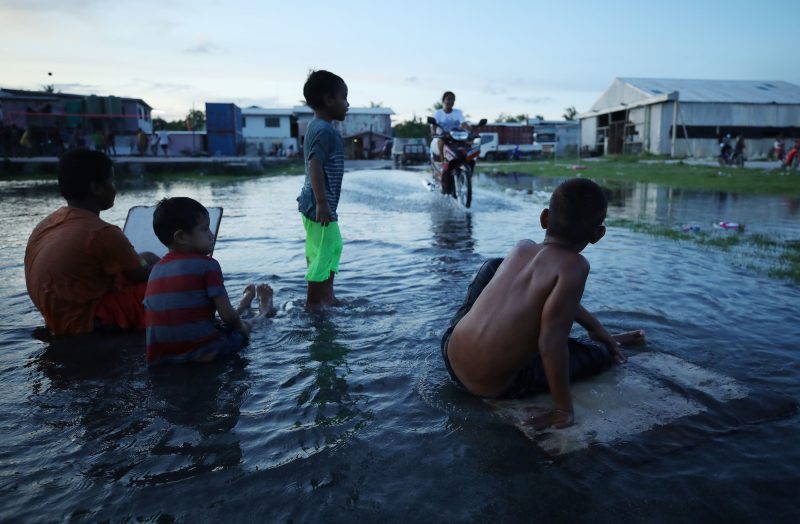
Source: The Guardian
Tuvalu and Vanuatu are visceral examples of a global problem. They live and struggle with the actual effects of climate change. They're small, traditional countries surrounded by rising waters.
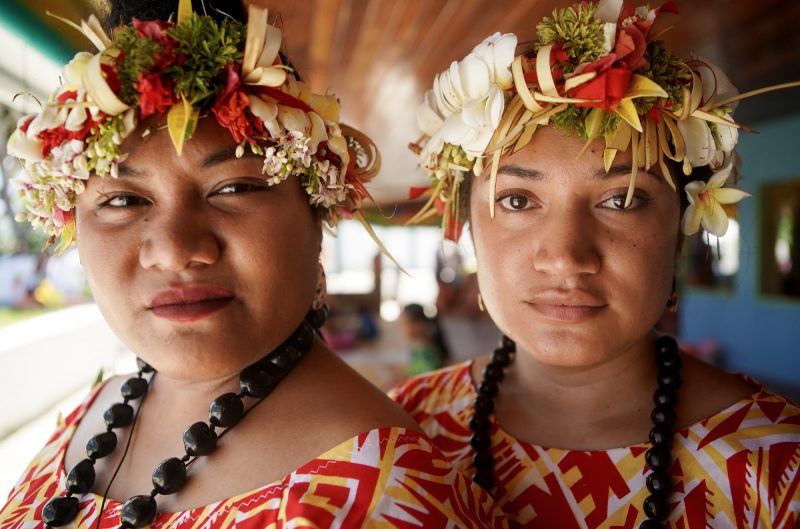
Source: The Guardian
About 11,000 people live in Tuvalu. The island nation is 10 feet above sea level at its highest point and could be unlivable within 50 to 100 years. Children play on sandbags installed to slow the effects of rising seas.

Source: The Guardian
Erosion isn't just a future problem for insurers. Every year, the islands get smaller. Two out of Tuvalu's nine islands are almost submerged. Leitu Frank told The Guardian, "The sea is eating all the sand."
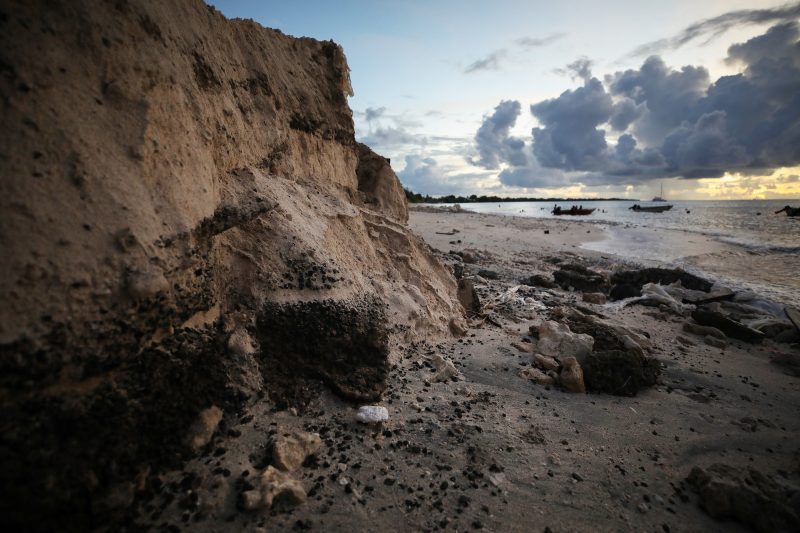
Source: The Guardian
Fresh water is a concern since rising seas have contaminated many of the islands' groundwater supplies. These men wait to offload shipped-in water to local villages in Vanuatu.
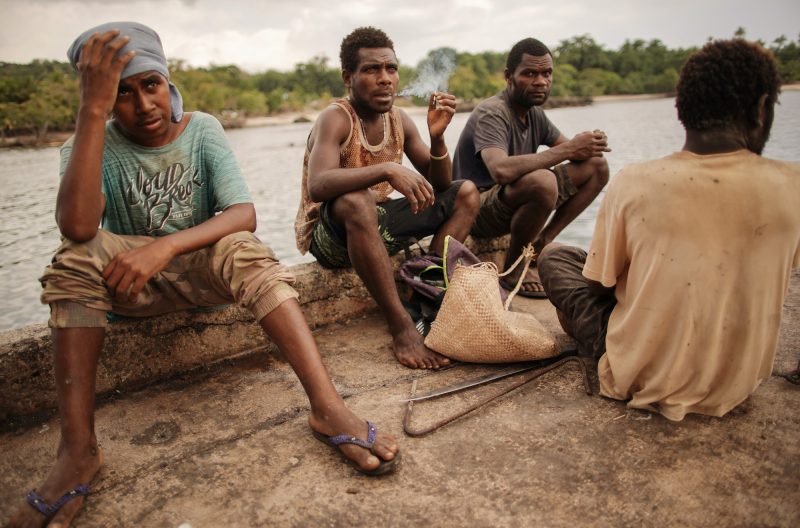
Source: The Guardian
Tuvalu has the same problem and is now reliant on rain and deliveries. But in the hot Pacific, it doesn't rain often.

Source: The Guardian
Their economies are affected, too. Vanuatu's people make a living mostly from tourism and farming.
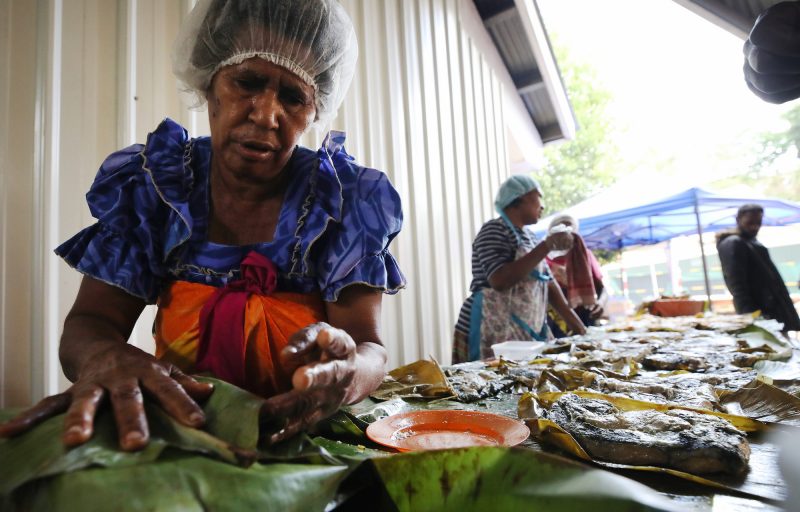
Source: The Commonwealth
For the last 2000 years, the island nation has relied on growing root vegetables like sweet potato, taro, and yams, to eat and sell.

Source: HuffPost
But farming is becoming increasingly difficult with droughts and salty soil. Here, a woman somberly watches the first significant amount of rainfall the country had in months, in December.
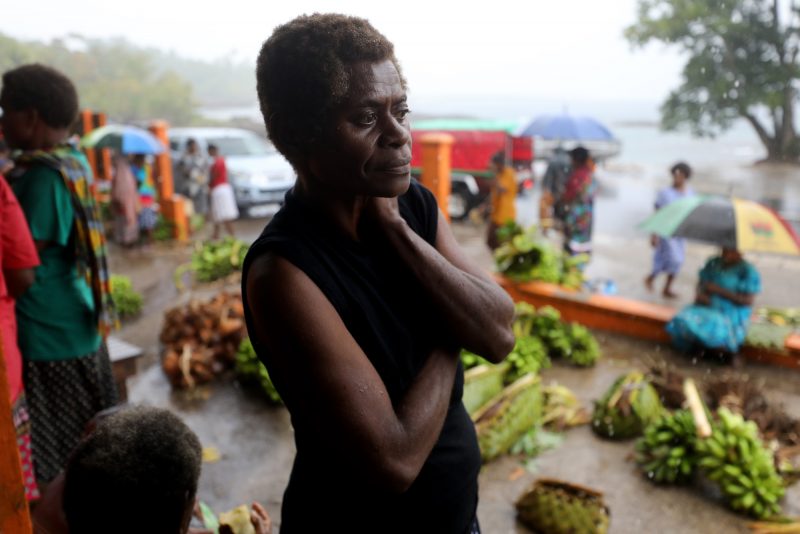
Source: The Guardian
Many people have had to abandon their gardens, and crops are grown in controlled environments.

Source: The Guardian
Fish, a once-abundant resource, has been affected as well. Fuli Siaosi who works for Tuvalu's fisheries department told The Guardian, "If there is a man in the family, he will most likely go fishing. It's cheap — it's for free!"
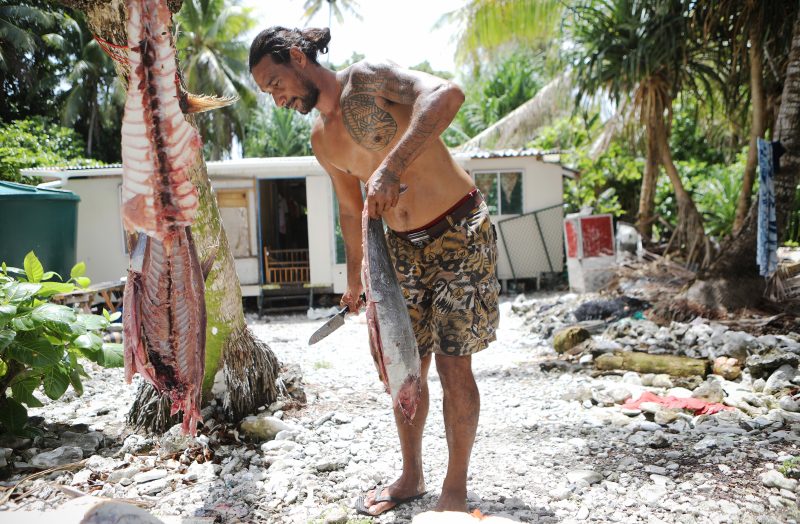
Source: The Guardian
But fish aren't always safe.

Bleached coral, from rising water temperatures, has been poisoning fish. It's called Ciguatera poisoning.
Eating poisoned fish can cause fevers and stomach problems. The poisoning became more common about a decade ago, as weather patterns began to change.

Source: The Guardian
Instead, food is shipped in. Along with staples like flour, food that used to be grown on the islands, like taro, is also delivered. But it's not cheap, and far less sustainable than growing crops.
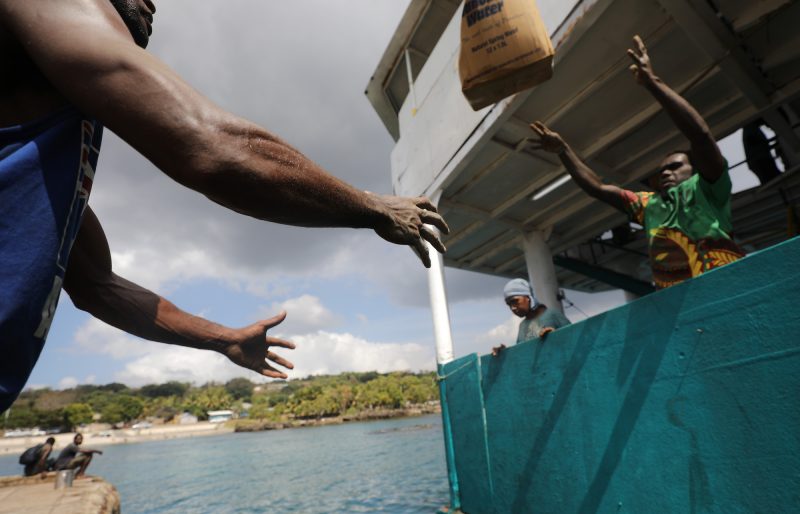
Source: The Guardian
Dealing with trash in such a small space is another difficulty.

On Tavalu, it's currently stored in a single dump, close to the ocean on one side and a lagoon on the other.
To help, plastic bags, straws, and styrofoam cups have been banned.
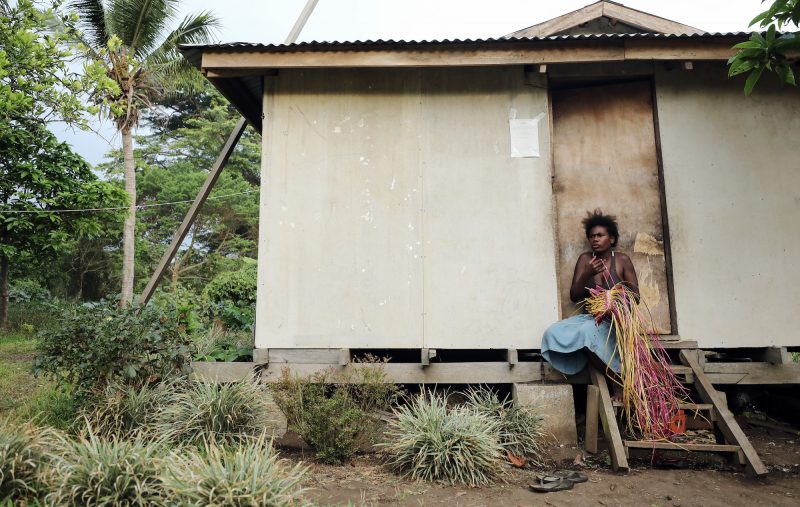
In February 2019, Tavalu announced its ban was expanding to include disposable diapers and plastic cutlery. As Regenvanu said, these small nations didn't cause the problem. But they're trying to alleviate it.
And then there's the psychological effect of rising sea levels. At high tide, low lying areas flood. Residents told The Guardian they had nightmares "that the sea will soon gobble them up for good."

Source: The Guardian
Bubbles percolate from the ground in floodwaters during high tides. A common local saying is, "Tuvalu is sinking."
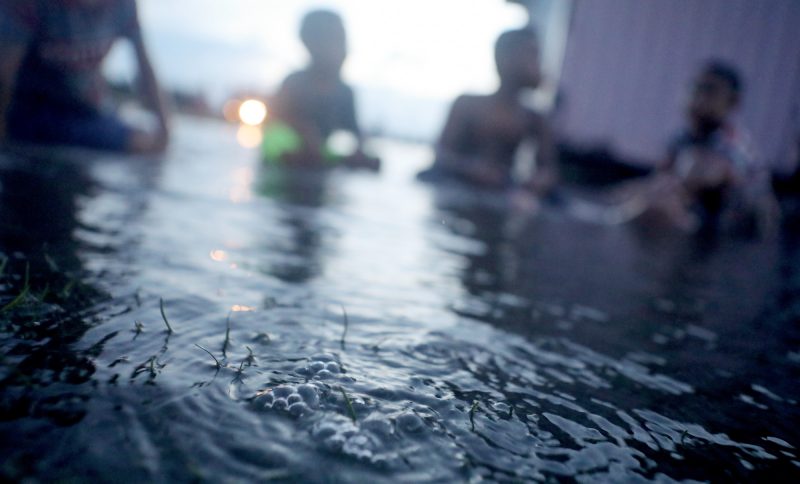
Source: The Guardian
But it's not all doom and gloom. Locals still celebrate. Here, dancers perform.
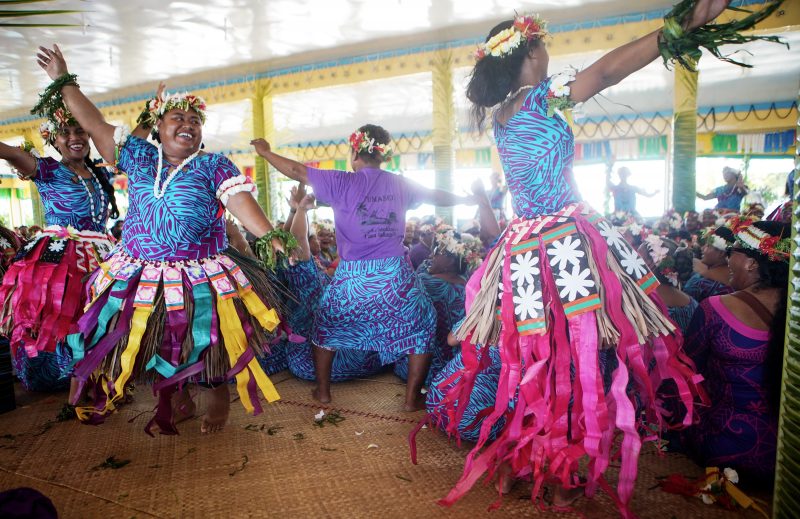
Tuvalu gets three commercial flights a week. For the rest of the week, locals make the most of the airport runway, playing and hanging out on the tarmac.

Source: The Guardian
They play volleyball on the white sand.

And they go to church. Vanuatu's main religion is Christianity, and across the islands there are Anglican, Presbyterian and, Roman Catholic churches. According to The Guardian, locals often say, "Come what may, God will save us."

Sources: The Guardian, Daily Post, World Info Zone
People swim. Which is handy as daily temperatures have risen.

Source: The Guardian
Already, 2,000 Tuvaluans have moved to New Zealand. It might not sound like much, but adds up when the entire population is 11,000.
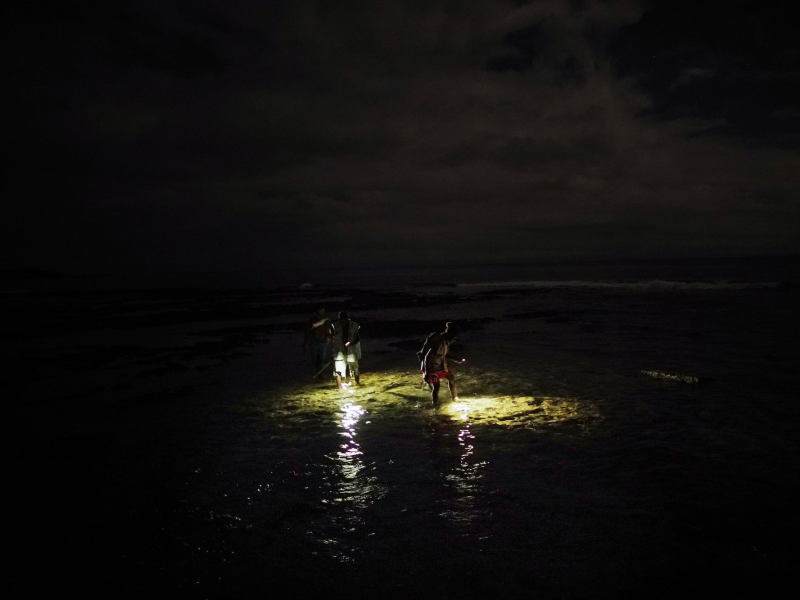
But Tuvalu's Prime Minister Enele Sopoago told The Guardian abandoning the islands was the last resort.
He said relocating people from low-lying countries didn't solve the problem. Solutions needed to be found, because it was not a Pacific problem, but a global one.
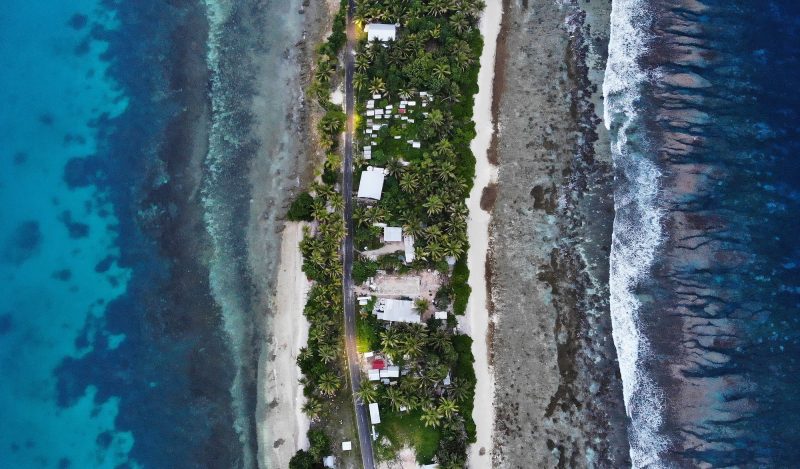
Source: The Guardian

